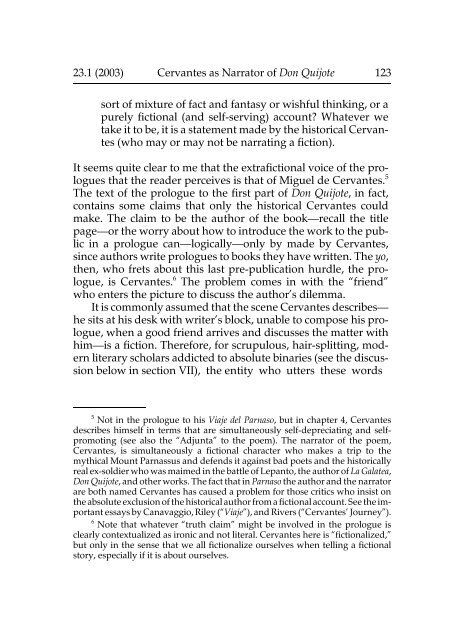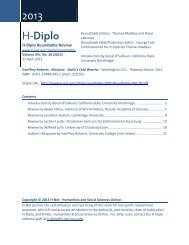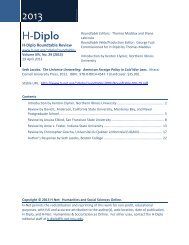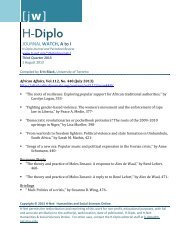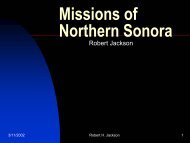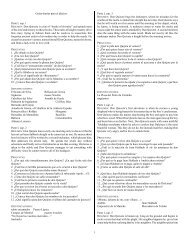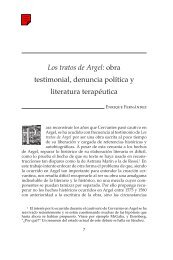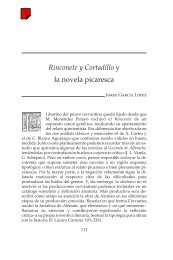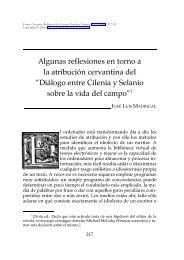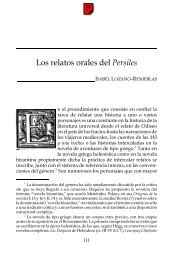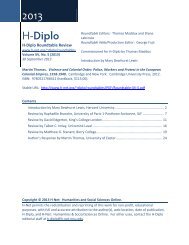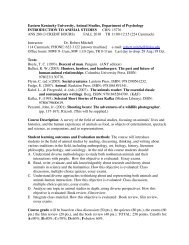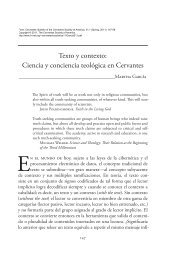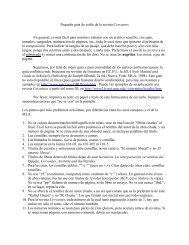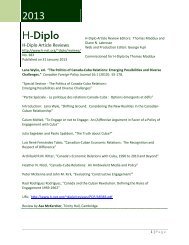Cervantes as Narrator of Don Quijote - H-Net
Cervantes as Narrator of Don Quijote - H-Net
Cervantes as Narrator of Don Quijote - H-Net
You also want an ePaper? Increase the reach of your titles
YUMPU automatically turns print PDFs into web optimized ePapers that Google loves.
23.1 (2003) <strong>Cervantes</strong> <strong>as</strong> <strong>Narrator</strong> <strong>of</strong> <strong>Don</strong> <strong>Quijote</strong> 123<br />
sort <strong>of</strong> mixture <strong>of</strong> fact and fant<strong>as</strong>y or wishful thinking, or a<br />
purely fictional (and self-serving) account? Whatever we<br />
take it to be, it is a statement made by the historical <strong>Cervantes</strong><br />
(who may or may not be narrating a fiction).<br />
It seems quite clear to me that the extrafictional voice <strong>of</strong> the prologues<br />
that the reader perceives is that <strong>of</strong> Miguel de <strong>Cervantes</strong>. 5<br />
The text <strong>of</strong> the prologue to the first part <strong>of</strong> <strong>Don</strong> <strong>Quijote</strong>, in fact,<br />
contains some claims that only the historical <strong>Cervantes</strong> could<br />
make. The claim to be the author <strong>of</strong> the book—recall the title<br />
page—or the worry about how to introduce the work to the public<br />
in a prologue can—logically—only by made by <strong>Cervantes</strong>,<br />
since authors write prologues to books they have written. The yo,<br />
then, who frets about this l<strong>as</strong>t pre-publication hurdle, the prologue,<br />
is <strong>Cervantes</strong>. 6 The problem comes in with the “friend”<br />
who enters the picture to discuss the author’s dilemma.<br />
It is commonly <strong>as</strong>sumed that the scene <strong>Cervantes</strong> describes—<br />
he sits at his desk with writer’s block, unable to compose his prologue,<br />
when a good friend arrives and discusses the matter with<br />
him—is a fiction. Therefore, for scrupulous, hair-splitting, modern<br />
literary scholars addicted to absolute binaries (see the discussion<br />
below in section VII), the entity who utters these words<br />
5 Not in the prologue to his Viaje del Parn<strong>as</strong>o, but in chapter 4, <strong>Cervantes</strong><br />
describes himself in terms that are simultaneously self-depreciating and selfpromoting<br />
(see also the “Adjunta” to the poem). The narrator <strong>of</strong> the poem,<br />
<strong>Cervantes</strong>, is simultaneously a fictional character who makes a trip to the<br />
mythical Mount Parn<strong>as</strong>sus and defends it against bad poets and the historically<br />
real ex-soldier who w<strong>as</strong> maimed in the battle <strong>of</strong> Lepanto, the author <strong>of</strong> La Galatea,<br />
<strong>Don</strong> <strong>Quijote</strong>, and other works. The fact that in Parn<strong>as</strong>o the author and the narrator<br />
are both named <strong>Cervantes</strong> h<strong>as</strong> caused a problem for those critics who insist on<br />
the absolute exclusion <strong>of</strong> the historical author from a fictional account. See the important<br />
essays by Canavaggio, Riley (“Viaje”), and Rivers (“<strong>Cervantes</strong>’ Journey”).<br />
6 Note that whatever “truth claim” might be involved in the prologue is<br />
clearly contextualized <strong>as</strong> ironic and not literal. <strong>Cervantes</strong> here is “fictionalized,”<br />
but only in the sense that we all fictionalize ourselves when telling a fictional<br />
story, especially if it is about ourselves.


